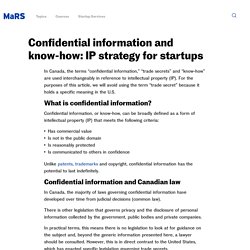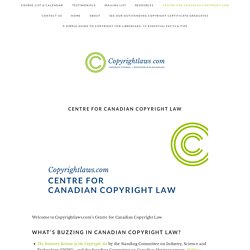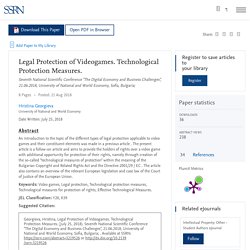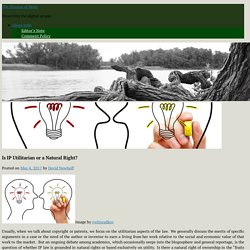

Fashion & Intellectual Property. Introduction to Intellectual Property: Crash Course IP 1. (9) Trade Secret Law Explained. (9) Trade Secrets. Confidential information & trade secrets in Canadian law. In Canada, the terms “confidential information,” “trade secrets” and “know-how” are used interchangeably in reference to intellectual property (IP).

For the purposes of this article, we will avoid using the term “trade secret” because it holds a specific meaning in the U.S. What is confidential information? Confidential information, or know-how, can be broadly defined as a form of intellectual property (IP) that meets the following criteria: Has commercial valueIs not in the public domainIs reasonably protectedIs communicated to others in confidence Unlike patents, trademarks and copyright, confidential information has the potential to last indefinitely. What is a trade secret? - Canadian Intellectual Property Office. Protect your business with a non-disclosure agreement - Canada Business. Are you looking for help bringing an invention to market?

Are you seeking financial assistance from a potential investor? If so, you may have heard of, or are putting together, a non-disclosure agreement. A non-disclosure agreement, also known as a NDA or confidentiality agreement, is intended to prevent an idea or technology from being stolen and copied. In today’s business climate there are several things that you may want to consider before presenting your potential partners with an NDA. (9) Trade Secrets. Centre for Canadian Copyright Law – From Copyrightlaws.com. Welcome to Copyrightlaws.com’s Centre for Canadian Copyright Law.

What’s buzzing in Canadian copyright law? The Statutory Review of the Copyright Act by the Standing Committee on Industry, Science and Technology (INDU) , and the Standing Committee on Canadian Heritage report, Shifting ParadigmsAmendments to the Copyright Act due to the USMCA (see below)York University’s appeal to the recent federal court fair dealing decision against them initiated by Access Copyright (see below)
(9) Basics of Canadian patent law (November 11, 2013) FrankPapadrovic eng. Legal protection & video games. Legal Protection of Videogames. Technological Protection Measures. by Hristina Georgieva. Seventh National Scientific Conference "The Digital Economy and Business Challenges", 21.06.2018, University of National and World Economy, Sofia, Bulgaria; Abstract.

Get your IP game on: intellectual property protection and video games. The video game industry around the world and in Canada is booming.

Not only does this market create new and varied forms of entertainment, it also creates jobs and generates staggering sales revenues. Industry statistics for the United States show sales of computer and video games having increased from $10.1 billion in 2009 to $24.5 billion in 2016.[1] In Canada, the Electronic Software Association of Canada 2015 Industry Report states that it identified 472 active studios in operation across Canada in 2015, compared to 329 studios in 2013.[2] Such increases are fast and substantial.
Over the years we have also seen accessibility to gaming increasing via different platforms from consoles to mobile and we have seen the gaming industry attract a wider audience across the ages of children, men and women. Get Your IP Game On: Intellectual Property Protection And Video Games. The video game industry around the world and in Canada is booming.

Not only does this market create new and varied forms of entertainment, it also creates jobs and generates staggering sales revenues. Industry statistics for the United States show sales of computer and video games having increased from $10.1 billion in 2009 to $24.5 billion in 2016.1 In Canada, the Electronic Software Association of Canada 2015 Industry Report states that it identified 472 active studios in operation across Canada in 2015, compared to 329 studios in 2013.2 Such increases are fast and substantial. Over the years we have also seen accessibility to gaming increasing via different platforms from consoles to mobile and we have seen the gaming industry attract a wider audience across the ages of children, men and women. With all this industry growth comes increased creativity and technological advancement.
(9) How to Register a Trademark (Canada): Trademarks, Patents and Copyrights - What's the Difference? (9) What is intellectual property? Is “Machine Learning” Copying or Reading? - The Illusion of More. The Great IP Debate: Do patents do more harm than good? Patents have been with us since the 17th century.

In exchange for disclosing one’s invention, the state grants a limited, legal monopoly over exploitation. In theory, the system encourages more innovation, for the good of society. But recently, voices of dissent have been rising. Legal costs are high. Specialists game the system to their advantage. On July 26 in Manchester, UK, at Euroscience Open Forum, Europe’s biggest biennial science conference, Science|Business Editor-in-Chief Richard L. The case against patents: David Levine, economist at the European University Institute in Florence, and Alessandro Nuvolari, economist at the Sant’Anna School of Advanced Studies in Pisa. Patents discourage innovation. Today, patents are often used as weapons. As another example, big companies today routinely cross-license patents to avoid blocking one another – but in the process also block new entrants that could disrupt the market, improve services and lower costs.
IOE_1 - OpenLearn - Open University - IOE_1. Machines, minds and computers - OpenLearn - Open University - M366_1. Network security - OpenLearn - Open University - T823_1. AIA Informational Videos. (1) First Inventor to File, Video #1. Performances and Phonograms Treaty. Red Hat License Agreements. Red Hat License Agreements. Software and the law: 4 IP rights: Common and public goods - OpenLearn - Open University - M814_1.
Ideas & Perspectives (IP) Ideas & Perspectives (IP) The US economy demonstrates the value of intellectual property. As 2017 begins, it is a good time to reflect on the impact that intellectual property has on the economy, particularly in light of a US Department of Commerce/USPTO’s report on the subject.

Is IP Utilitarian or a Natural Right? - The Illusion of More. Image by ivelinradkov Usually, when we talk about copyright or patents, we focus on the utilitarian aspects of the law.

We generally discuss the merits of specific arguments in a case or the need of the author or inventor to earn a living from her work relative to the social and economic value of that work to the market. But an ongoing debate among academics, which occasionally seeps into the blogosphere and general reportage, is the question of whether IP law is grounded in natural rights or based exclusively on utility. Intellectual Property Web Resources.
Blogs & News Aggregates. Copyrights. Patents. Trademarks. Industrial Designs. Trade Secrets. Domain Names.